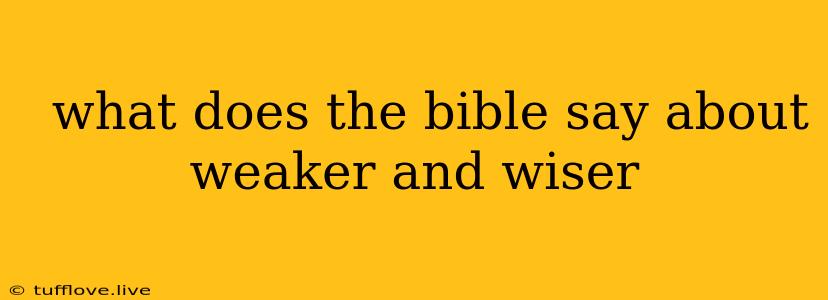The Bible, a collection of ancient texts revered by Christians and Jews, offers a wealth of wisdom on various aspects of human life. One particularly intriguing theme explored within its pages is the relationship between wisdom and strength, often presented in the context of "weaker" and "wiser." While the Bible doesn't offer a singular, definitive answer, it provides valuable insights into how these seemingly contrasting qualities interact and inform our understanding of human nature and the divine.
The Wisdom of the Meek
The Bible frequently associates humility and meekness with wisdom. In Proverbs 11:2, we read: "When pride comes, then comes disgrace, but with the humble is wisdom." This verse highlights the dangers of pride and how it can blind us to true understanding, while humility opens the door to wisdom. Furthermore, in Matthew 5:5, Jesus declares: "Blessed are the meek, for they will inherit the earth." Meekness is not weakness but a recognition of one's dependence on a higher power and a willingness to submit to God's will. This submission, the Bible suggests, is the foundation for true wisdom.
Learning from the "Weaker"
The Bible often uses the imagery of the "weak" to illustrate a deeper truth. For instance, in 1 Corinthians 1:25-29, Paul writes, "For the foolishness of God is wiser than human wisdom, and the weakness of God is stronger than human strength. Consider your calling, brothers. Not many of you were wise by human standards, not many were powerful, not many were of noble birth. But God chose the foolish things of the world to shame the wise; God chose the weak things of the world to shame the strong." This passage challenges our earthly perception of strength and wisdom, suggesting that God often chooses the seemingly "weaker" to confound the "stronger." This principle is further emphasized in 1 Corinthians 10:13: "No temptation has overtaken you that is not common to man. God is faithful, and he will not let you be tempted beyond your ability, but with the temptation he will also provide the way of escape, that you may be able to endure it." Here, we see that even in the face of weakness and temptation, God provides a path toward resilience and wisdom.
Wisdom in the Face of Power
The Bible also explores the wisdom required to navigate the complexities of power dynamics. In Proverbs 16:32, we read: "Whoever is slow to anger is better than the mighty, and he who rules his spirit than he who takes a city." This verse emphasizes the importance of self-control and restraint, even in the face of power. True strength, the Bible suggests, lies not in brute force or dominance but in the ability to control one's emotions and actions. Similarly, in Proverbs 29:2, we find: "When the righteous increase, the people rejoice, but when a wicked man rules, people groan." This verse highlights the importance of ethical leadership and how the actions of those in power directly impact the well-being of the people they govern.
A Life of Wisdom and Strength
The Bible, in its intricate tapestry of stories, parables, and poetry, encourages us to seek wisdom in all aspects of life. It doesn't advocate for weakness but for a strength that is rooted in humility, compassion, and understanding. The "wiser" are not necessarily those who are physically strong or possess worldly power, but those who are attuned to the needs of others, willing to learn from those considered "weaker," and who submit their will to a higher power.
In conclusion, the Bible's perspective on "weaker" and "wiser" challenges us to re-evaluate our preconceived notions of strength and wisdom. It offers a rich tapestry of teachings that point towards a life lived in humility, understanding, and submission to a higher power. By embracing these principles, we can unlock the true potential of our own strength and wisdom and move closer to the divine.
